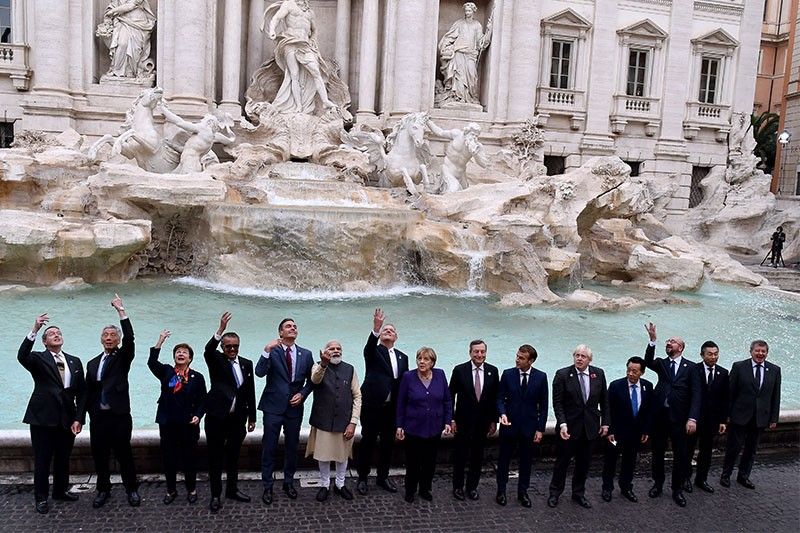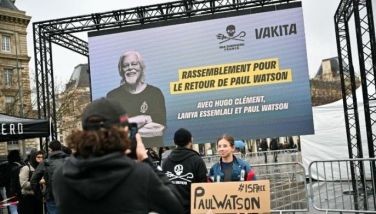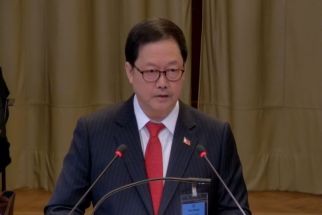G20 disappoints on key climate target as eyes turn to Glasgow

ROME, Italy — The G20 major economies committed on Sunday to the key goal of limiting global warming to 1.5 degrees Celsius, but some disappointed leaders warned more was needed to make a success of UN climate talks beginning in Glasgow.
British Prime Minister Boris Johnson, the host of the COP26 summit that opened on Sunday, said the pledge from world leaders after two days of talks in Rome was "not enough", and warned of the dire consequences for the planet.
"If Glasgow fails, the whole thing fails," he told reporters, saying the G20 commitments were "drops in a rapidly warming ocean".
UN Secretary General Antonio Guterres said he left Rome "with my hopes unfulfilled — but at least they are not buried".
The G20 nations between them emit nearly 80 percent of carbon emissions, and a firm commitment on action was viewed as vital for the success of the UN's COP26.
US President Joe Biden said the summit made "tangible" progress on many issues but said he found it "disappointing" that Russia and China, whose leaders attended only via videolink, did not offer stronger climate pledges.
He vowed to "continue to focus on what China is not doing, what Russia is not doing, and what Saudi Arabia is not doing."
Meaningful actions
In a final communique, the G20 reaffirmed its support for the goals in the landmark 2015 Paris climate accords, to keep "the global average temperature increase well below 2 degrees and to pursue efforts to limit it to 1.5 degrees above pre-industrial levels".
They said this would require "meaningful and effective actions and commitment by all countries, taking into account different approaches", while they also promised measures against coal use.
But experts say meeting the 1.5 degree target means slashing global emissions nearly in half by 2030 and to "net-zero" by 2050 — and the G20 set no firm date, speaking only of reaching the goal of net zero "by or around mid century".
Italian Prime Minister Mario Draghi, who hosted the G20 talks, said he was "proud of these results, but we must remember that it's only the start".
Eyes now turn to Glasgow, where more than 120 heads of state and government, including Biden, India's Narendra Modi and Australia's Scott Morrison, were heading from Rome.
Lacking ambition
The G20 leaders did agree to end funding for new unabated coal plants abroad — those whose emissions have not gone through any filtering process — by the end of 2021.
But environmental campaign group Greenpeace slammed the final statement as "weak, lacking both ambition and vision", saying G20 leaders "failed to meet the moment".
"If the G20 was a dress rehearsal for COP26, then world leaders fluffed their lines," said Executive Director Jennifer Morgan.
Friederike Roder, senior director at anti-poverty group Global Citizen, told AFP the summit had produced "half-measures rather than concrete actions".
European leaders pointed out that given the fundamental divisions among the world's most advanced nations, a joint commitment to what was the most ambitious Paris goal was a step forward.
"I hear all the very alarmed talk on these subjects. I'm myself worried and we are fully mobilised," said French President Emmanuel Macron.
"But I would like us to take a step back and look at the situation where we were four years ago", when former US President Donald Trump announced he was pulling out of the treaty.
Draghi said that the needle had moved markedly even in the past few days, including by China — by far the world's biggest carbon polluter.
Beijing plans to make its economy carbon neutral before 2060, but has resisted pressure to offer nearer-term goals.
'Dream big'
Earlier on Sunday, Draghi, Britain's Prince Charles and Pope Francis had all called on leaders to think big.
Calling climate change "the defining challenge of our times", Draghi warned: "Either we act now... or we delay acting, pay a much higher price later, and risk failing."
Pope Francis, who is outspoken on the issue and received several G20 leaders at the Vatican this weekend, said: "This is a moment to dream big, to rethink our priorities... The time to act, and to act together, is now!"
Bookmark this page for updates on the United Nations climate summit, known as COP26. Photo courtesy of AFP/Tolga Akmen
Singapore announces it aims to achieve carbon neutrality by 2050, giving a firm date for the first time, and will look at using hydrogen as a major power source.
The city-state targets for carbon emissions to peak in 2030 at 60 million tonnes, a reduction of five million tonnes from the previous goal, Deputy Prime Minister Lawrence Wong said.
The Southeast Asian nation also has plans to look at developing low carbon hydrogen as a major power supply in the long term. — AFP
Australia will present a more ambitious UN emissions target "very soon" and is bidding to co-host a COP summit with Pacific island neighbours, Foreign Minister Penny Wong said Thursday, signalling a ground shift in climate policy.
During a first solo overseas visit since her centre-left government was sworn in, Wong admitted that on the climate, "Australia has neglected its responsibility" under past administrations.
She told hosts in Fiji's capital Suva that there would be no more "disrespecting" Pacific nations or "ignoring" their calls to act on climate change.
"We were elected on a platform of reducing emissions by 43 percent by 2030 and reaching net-zero by 2050," Wong said. — AFP
Countries have proposed to hold an extra biodiversity meeting in Nairobi in June as talks in Geneva tasked with saving nature entered their final day Tuesday without an agreement.
In a document uploaded on the conference website, dated Monday, countries suggest holding a new meeting in the Kenyan capital between June 21 and 26 to "continue negotiations" on the document and other issues.
The decision is subject to official approval by the Geneva meeting before it wraps up later Tuesday. — AFP
British Prime Minister Boris Johnson on Sunday hails a global accord to speed up action against climate change as "truly historic" and "the beginning of the end for coal power".
But he says his "delight at this progress" at the UN COP26 summit in Glasgow was "tinged with disappointment" because of a failure to secure the agreement of all countries to phase out hydrocarbons.
"Those for whom climate change is already a matter of life and death, who can only stand by as their islands are submerged, their farmland turned to desert, their homes battered by storms, they demanded a high level of ambition from this summit," says Johnson. — AFP
A UN climate summit text on Saturday urges nations to accelerate the phase-out of unfiltered coal and "inefficient" fossil fuel subsidies, after large emitters tried to remove the mention of polluting fuels.
The text, which comes after two weeks of frantic negotiations at the COP26 summit in Glasgow, omitted any reference to specific finance for "loss and damage" -- the mounting cost of global heating so far -- which has been a key demand of poorer nations.
The mention on Saturday of fossil fuels was weaker than a previous draft, which called on countries to "accelerate the phasing out of coal and subsidies for fossil fuels". — AFP
- Latest































